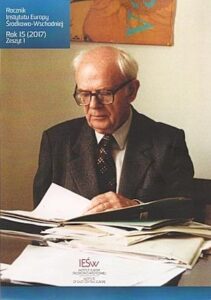ORCID: Michał Nowosielski: 0000-0001-7383-4872
Pages: 139-158
Edition: Lublin 2017
DOI: --
Citation method: M. Nowosielski, W. Nowak, Między Wschodem a Zachodem – geograficzne ukierunkowanie polityki polonijnej i jego przemiany w latach 1989-2017, „Rocznik Instytutu Europy Środkowo-Wschodniej”, 15 (2017), z. 1, s. 139-158.
Abstract:
The aim of the article is to examine the changes in the orientation of the Polish diaspora policy (Polonia policy) on the East-West axis, their conditions and perception presented by representatives of institutions involved in the creation and implementation of the Polish diaspora policy. Although the Polonia policy implemented after 1989 concerned both communities – Poles in the East and Poles in the West, one can observe temporary changes in orientation, consisting in applying more or less importance to one of the directions. The article presents the results of the analysis of official documents which were the basis for the transformation of the Polish diaspora policy in years 1989-2016. In addition, the results of empirical research conducted in 2015-2017 among representatives of institutions implementing the Polish diaspora policy are discussed. To interpret research results we used the typology categorizing types of perspectives explaining the emergence and development of diaspora policies, developed by Gamlen and colleagues. It captures three perspectives: tapping, embracing and governing perspective. The results of the research presented in the article suggest that in the case of Poland, on the one hand, there is a coexistence of the embracing and tapping perspective, and on the other, temporary emphasis on one or the other approach can be observed.
Bibliography:
Aikins K., White N., Global Diaspora Strategies Toolkit, Dublin 2011.
Barry K., Home and Away: the Construction of Citizenship in an Emigration Context, „New York University Law Review”, t. 81, 2006, nr 1.
Brubaker R., Nationalism reframed: nationhood and the national question in the New Europe, New York 1996.
Chałupczak H., Firlit-Fesnak G., Lesińska M., Solga B., Polityka migracyjna Polski wobec najnowszej emigracji Polaków po 2004 roku, [w:] M. Lesińska, M. Okólski, K. Slany, B. Solga (red.), Dekada członkostwa Polski w UE. Społeczne skutki emigracji Polaków po 2004 roku, Warszawa 2014.
Délano A., The diffusion of diaspora engagement policies: A Latin American agenda, „Political Geography”, t. 41, 2014.
Desiderio M. V., Weimar A., Supporting immigrant integration in Europe? Developing the governance for diaspora engagement, Brussels 2014.
Fiń A., Legut A., Nowak W., Nowosielski M., Schöll-Mazurek K., Polityka polonijna w ocenie jej wykonawców i adresatów, „IZ Policy Papers”, 2013, nr 11.
G. Babiński, Modele polityki wobec emigracji, Polonii i Polaków za granicą. Sugestie dla polskiej polityki zagranicznej, „Rocznik Polskiej Polityki Zagranicznej”, 1992.
Gamlen A. i in., Explaining the rise of diaspora institutions, „IMI Working Papers Series”, 2013, nr 78.
Gamlen, A., Why Engage Diasporas?, „COMPAS Working Papers”, 2008, nr 63.
Iskander N., Creative State: Forty Years of Migration and Development Policy in Morocco and Mexico, New York 2010.
Koser K., Long-Distance Nationalism and the Responsible State: The Case of Eritrea, [w:] International Migration and Sending Countries: Perceptions, Policies and Transnational Relations, red. E. Østergaard-Nielsen, Basingstoke 2003.
Ministerstwo Spraw Zagranicznych, Priorytety polskiej polityki zagranicznej 2012-2016, http://www.msz.gov.pl/resource/aa1c4aec-a52f-45a7-96e5–06658e73bb4e:JCR [dostęp: 23.11.2017].
Ministerstwo Spraw Zagranicznych, Rządowy program współpracy z Polonią i Polakami za granicą zaakceptowany na posiedzeniu Rady Ministrów w dniu 10.12.2002 r., http://www.belgrad.msz.gov.pl/pl/polonia_w_serbii/rzadowy_program_wspolpracy_z_polonia/ [dostęp: 01.11.2013].
Ministerstwo Spraw Zagranicznych, Rządowy program współpracy z Polonią i Polakami za granicą przyjęty przez Radę Ministrów w dniu 30.10.2007 r., http://www.msz.gov.pl/resource/ad28993a-f211-4db2-8263-c655c928410b [dostęp: 23.11.2017].
Ministerstwo Spraw Zagranicznych, Rządowy program współpracy z Polonią i Polakami za granicą w latach 2015-2020, http://www.msz.gov.pl/resource/70a7021e-304c-4075-a812-18e5b3410966:JCR [dostęp: 23.11.2017].
Nowosielski M., Nowy „Rządowy program współpracy z Polonią i Polakami za granicą”, „Biuletyn Instytutu Zachodniego”, 2015, nr 202.
Nowosielski, M., Organizacje polskie w Niemczech. Stan i uwarunkowania, Poznań 2016.
Østergaard-Nielsen E., Turkey and the ‘Euro Turks:’ Overseas Nationals as an Ambiguous Asset, [w:] International Migration and Sending Countries: Perceptions, Policies and Transnational Relations, red. E. Østergaard-Nielsen, Basingstoke 2003.
Portes A., Escobar C., Radford A. W., Immigrant Transnational Organizations and Development: A Comparative Study, „International Migration Review”, 2007, nr 1.
Rada Ministrów, „Cele i priorytety polityki rządu wobec Polonii, emigracji i Polaków za granicą”, załącznik do uchwały nr 145/91 Rady Ministrów z dnia 5 listopada 1991 r. w sprawie współpracy z Polonią, emigracją i Polakami za granicą (maszynopis w posiadaniu autorów).

PDF: Download